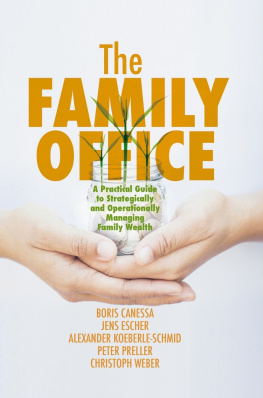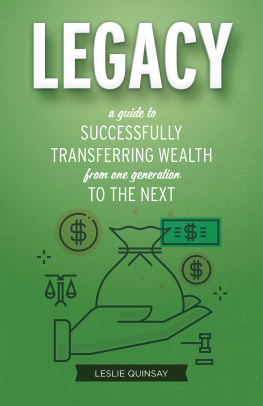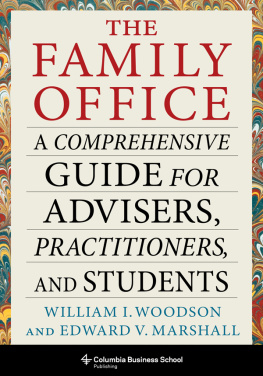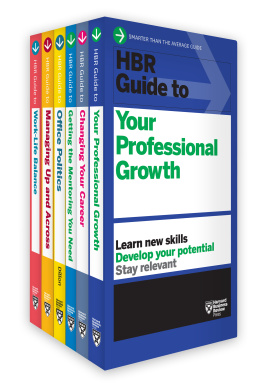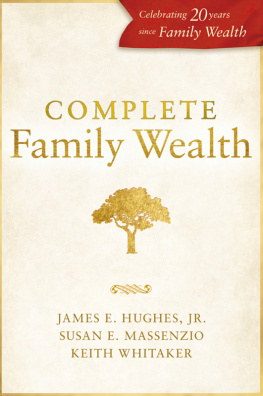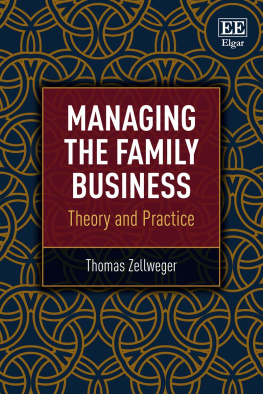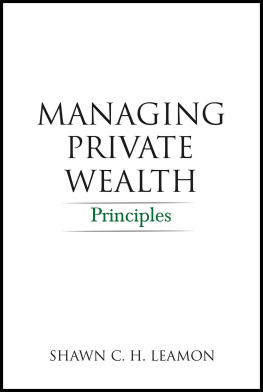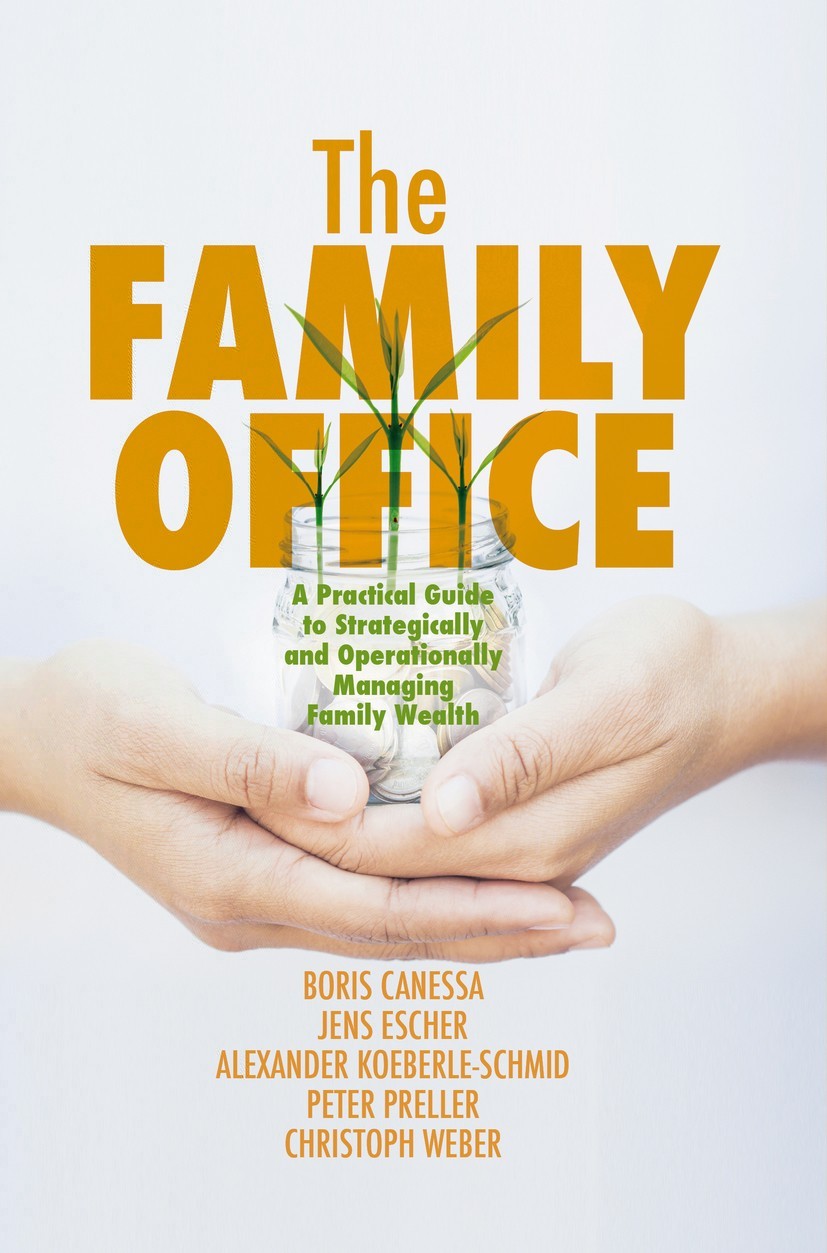Boris Canessa , Jens Escher , Alexander Koeberle-Schmid , Peter Preller and Christoph Weber
The Family Office A Practical Guide to Strategically and Operationally Managing Family Wealth
Boris Canessa
Dsseldorf, Germany
Jens Escher
Duisburg, Germany
Alexander Koeberle-Schmid
Kln, Germany
Peter Preller
Bad Homburg, Germany
Christoph Weber
Essen, Germany
ISBN 978-3-319-99084-2 e-ISBN 978-3-319-99085-9
https://doi.org/10.1007/978-3-319-99085-9
Library of Congress Control Number: 2018955893
Springer Nature Switzerland AG 2018
This work is subject to copyright. All rights are solely and exclusively licensed by the Publisher, whether the whole or part of the material is concerned, specifically the rights of translation, reprinting, reuse of illustrations, recitation, broadcasting, reproduction on microfilms or in any other physical way, and transmission or information storage and retrieval, electronic adaptation, computer software, or by similar or dissimilar methodology now known or hereafter developed.
The use of general descriptive names, registered names, trademarks, service marks, etc. in this publication does not imply, even in the absence of a specific statement, that such names are exempt from the relevant protective laws and regulations and therefore free for general use.
The publisher, the authors and the editors are safe to assume that the advice and information in this book are believed to be true and accurate at the date of publication. Neither the publisher nor the authors or the editors give a warranty, express or implied, with respect to the material contained herein or for any errors or omissions that may have been made. The publisher remains neutral with regard to jurisdictional claims in published maps and institutional affiliations.
Cover credit: Nednapa Chumjumpa / EyeEm
This Palgrave Macmillan imprint is published by the registered company Springer Nature Switzerland AG
The registered company address is: Gewerbestrasse 11, 6330 Cham, Switzerland
Translators Preface
There is an old parable about the wise woman and a glass jar. She drops large stones into the jar until no more will fit, and then asks a child whether the container is full. Yes, it is, says the child. So the wise woman adds in smaller rocks which tumble into the remaining spaces. When the child opines that now the jar is full, the wise woman pours in pebbles, then sand, and finally water. Each new material, smaller and finer than the one before, closes the ever-shrinking gaps until truly the jar can hold no more.
As I helped shepherd this book from a focus on the German-speaking world to a broader international outlook, I had that jar very much in mind. Each of the five authors is a specialist in a field crucial to the operation of a family officelaw, family governance, leadership and succession and asset analysis and investment. Their chapters serve the same function as those big rocks, addressing the major weighty considerations that are involved with establishing and operating a family office.
The numerous interviews in this book are the smaller rocks, helping to fill the gaps that naturally arise between theory and practice. They contain insights and considerations gleaned from real experience working or advising a family office, building one from scratch, or being an owner of an established family office.
The new final chapter of this book delivers the pebbles. It reflects two specific questions posed to each interview partner: Firstly, what are potential traps that people face when looking to found or sustain a family office? Secondly, what is the future of the family office? The answers sometimes contradict each other, and that is fine. Real life contradicts itself sometimes as well, especially as you move firmly into the realm of your own specific needs and solutions.
And the sand and water of our parable? That fine-grained knowledge is to be provided by you and the generations that follow.
Steven Sidore
Knigswinter, Germany
Preface
The model of the family office dates back to medieval times. Its core function was embodied by the figure of the majordomo, the highest-ranking servant for a European house of nobility, entrusted to manage the houses domestic affairs. The first family office in the modern sense, the Morgan House, was founded in 1838 by captain of industry J.P. Morgan to serve his family. The office later took on the Vanderbilts, Guggenheims and DuPonts as clients, evolving into the first multi family office.
The real breakthrough for the family office came in the 1980s, a period of unprecedented wealth creation. Yet this had little to do with private jets, yachts, holiday villas and imposing oak-paneled offices. Disenchanted with the flaws inherent to commercial wealth management offerings, a growing number of ultra high net worth individuals and entrepreneurial familiesfirst in the USA, then in Europesimply began looking for alternatives. Many saw the wisdom in Morgans choice to establish a separate, highly competent deputy between the family and its financial service providers. These new single family offices worked exclusively for their respective families to preserve and expand the accumulated wealth for the generations to come.
Financial service providers did not fail to grasp the potential of this trend as a potent business field for themselves. Wealth managers, larger auditing firms and tax accountancies began developing their own in-house family office-style service packages. Later, large financial institutions began offering packages of services divorced from their classic private banking or wealth management departmentsthe dawn of the commercial bank-bound multi family office. Over time some of those providers withdrew from the market, leading their former employees to found a wave of new, independent multi family office companies. These then served a clientele ranging from a handful of families to a high two-digit number of families, all very individually and hopefully free of conflict of interest.
The number of billionaires has grown sharply worldwide in recent years, with especially powerful growth observed in China. For the first time in documented history, 2017 counted more billionaires in Asia (637) than in the USA (563). Driven by this ongoing global creation of affluence, the ranks of single family offices have grown ceaselessly in recent years. At the same time, hundreds of multi family offices have also arisen around the world, especially in Latin America, the Middle East and Asia. With roughly $2.4 trillion expected to be passed on to the next generation in the coming two decades, many affluent families and wealthy individuals see real value in having a family office as a loyal partner and competent advisor. They rest easier knowing they have an organization working for them that can adapt to changing conditions and family dynamics and scale as the family and its wealth grow more complex.
This book approaches the almost dizzying array of family office solutions as its challenge and its mission. It was conceived as a forthcoming, transparent and above all else practically minded introduction for affluent families in the early stages of considering a family office. We, the five authors, are active practitioners within the family office sphere, and some of us are also member-owners of a family office. We try to write clearly and frankly about the advantages and disadvantages of single family offices and multi family offices, as well as classic bank-based wealth management without a family office. Our goal at all times is to demystify the topic and lend courage for families to get organized and undertake their first steps in this field.

